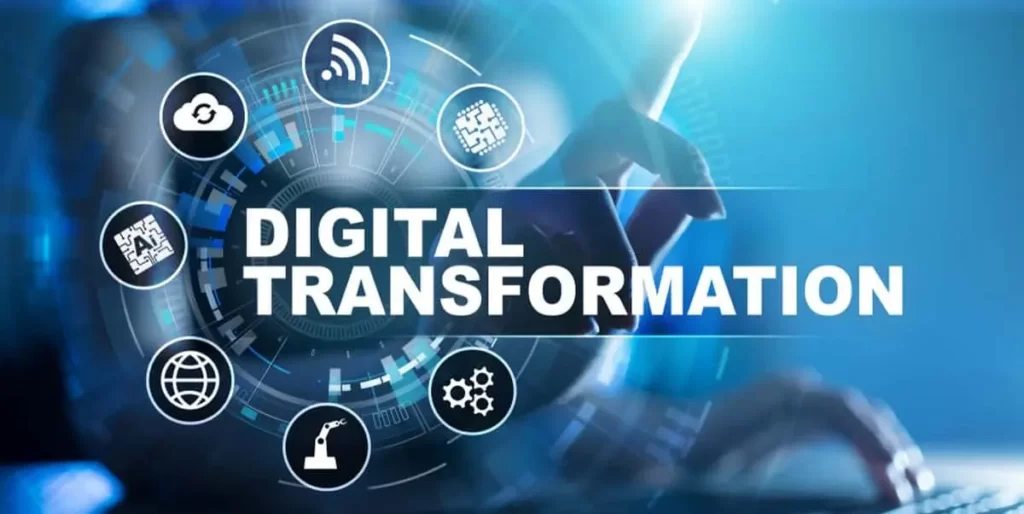Blockchain Helps Businesses: Blockchain is one of the central technologies of this transformation.
The basic features of the database technology were already outlined in 1991, but it wasn’t until 2009 that blockchain was first used in practice with the digital currency Bitcoin. Since then, the possible uses for Blockchain have developed rapidly. In many areas, however, technology is still in its infancy. Nevertheless, experts are certain that blockchain will have a radical impact on the business world in the coming years.

Blockchain
A blockchain is a distributed database or ledger that is shared among the nodes of a computer network. As a database, a blockchain stores information electronically in a digital format. Blockchains are best known for their crucial role in cryptocurrency systems, such as Bitcoin, for maintaining a secure and decentralized record of transactions. The innovation of a blockchain is that it guarantees the fidelity and security of a record of data and generates trust without the need for a trusted third party.
Digital Transformation
Digital transformation is the process by which companies embed technologies across their businesses to drive fundamental change. The benefits – Increased efficiency, greater business agility, and, ultimately, the unlocking of new value for employees, customers, and shareholders.
Digitization is the process of translating analog information and data into digital form—for example, scanning a photo or document and storing it on a computer.
Digitalization is the use of digital technologies to change business processes and projects—such as skilled employees using new software platforms designed to help launch products faster. While digital transformation might include digitalization efforts, it goes beyond the project level and affects the entire organization.

5 Ways Blockchain Helps Businesses Accelerate Digital Transformation
1. Blockchain as the Standard for Digital Transactions
Blockchain Helps Businesses: Instead of being stored centrally, blockchain is a virtual database that is stored in a network where each user within the network has a local copy of the database. The decentralized structure combined with the use of cryptographic procedures ensures that no information in the database can be secretly manipulated by a user. In addition, each transaction must be sent as a cryptographically-protected block to the entire network and be verified.
This way, the blockchain creates an extremely high level of trust in peer-to-peer transactions without the need for a middleman to monitor the transaction. As B2B and B2C, businesses increasingly shift to a digital market, blockchain has the potential to become a pivotal technology of digital transformation. It creates trust and security for consumers, customers, trade, and business partners in the anonymous world of cross-border digital connectivity.

2. Blockchain as an Accelerator of Business Processes
Blockchain Helps Businesses: In digital transformation, speed is one of the crucial factors that set you apart from the competition. What’s more, business processes that store and transfer data in a blockchain offer extremely high levels of security.
On this basis, you have the possibility to implement fully automated transactions in different business areas. This process is not only reliable and secure, but it is also extremely fast.
3. Blockchain as a Game Changer in the Supply Chain
Blockchain Helps Businesses: Digital transformation gives companies huge scope to reorganize their supply chains. The blockchain can become an essential building block that could prove to be one of the game changers when it comes to setting yourself apart from competitors in the coming years.
The decentralized nature of the blockchain creates maximum transparency in every transaction in the supply chain – from the procurement of raw materials and production to distribution and the sale of the end product. Each transaction can be quickly and easily logged in the blockchain at a marginal cost. This way, there are fewer risks and the end customer is able to trace a product’s origin throughout the entire supply chain.

4. Blockchain as the Architecture for Connectivity
Blockchain Helps Businesses: Digital transformation is rebuilding the communication infrastructure in companies: The Internet of Things connects all kinds of devices, machine-to-machine communication streamlines industrial production and cloud-based services allow ubiquitous access to data, information, and applications. This development provides companies with many opportunities to completely redesign production and work processes.
The constantly growing levels of connectivity, however, also pose companies with ever-increasing challenges when it comes to handling this data. New blockchain platforms, which operate using a leaner proof of stake validation, are able to securely and transparently manage the vast amount of data generated in the business processes of digital transformation.
5. Blockchain as a Platform for Smart Contracts
Blockchain Helps Businesses: Digital smart contracts have long been used in various business processes. In order to conclude them, however, you typically need a central IT system guaranteeing the security of the data and an intermediary ensuring compliance with the rules.
The blockchain will make both instances superfluous in the future. Smart contracts not only enable the secure storage of information in a blockchain, but they can also automatically modify information in a trustworthy manner. Smart contracts can be set up based on agreements made in advance and are largely tamper-proof and transparent. This way, they can revolutionize the digitalization of business processes in the future.

10 Ways Blockchain Enhances the Existing Business Model
Blockchain technology provides multiple advantages to businesses and introduces new ways to revamp existing business models while reducing costs, lowering intermediaries’ time consumption, and strengthening a higher level of trust in an ecosystem. Here are the 10 ways businesses can embrace blockchain in their digital transformation journey.
1. Smart Contracts
The foremost application of blockchain for business transformation is smart contracts. As you can depict from its name, smart contracts are a kind of self-executing contract where all the terms and conditions from both parties are written in the form of codes. These codes are then stored on a decentralized blockchain network, making them immutable.
So, whenever the codes written are fulfilled, the associated conditions are executed. If in case any of the parties overrules the conditions, the services/products are returned back to the other party. This way, the use of smart contracts encourages businesses to execute legal actions without involving any regulating attorney, government officials, or other fee-charging middlemen to settle disputes.

2. Ease of Payment
The collaboration of blockchain and digital payments is also one of the obvious applications of decentralized blockchain networks. By removing the involvement of third parties and associated documents like billing statements and invoices, blockchain has also eased the cash flow in startups and establishments.
Suppose, you run a medical organization. By harnessing the power of blockchain, you can claim to a patient’s insurance provider if both are on the same platform. While being on the same blockchain network, the insurance company will be familiar with the number of times a patient visited your medical organization along with access to all the payment details. This will create a transparent environment and enable the company to respond to your claim immediately. At the same time, patients also get comprehensive details about the co-payment even before leaving your office.
3. Supply Chain Management
When talking about the role of Blockchain in the Supply Chain, the technology enables SMEs to track their products/services throughout the process – right from manufacturing to transportation, and delivery at the consumer end. It introduces the power of transparency and immutability into the process, making it possible for companies to combat counterfeiting, delays in product delivery, as well as robust security in the process.

For example, Walmart, the retail giant has integrated blockchain technology into its food chain supply to add transparency to the decentralized food supply ecosystem. After implementing blockchain, the company can now track the provenance and condition of its pork items imported from China. Also, it can now track any issues in the batches from a specific location.
4. Better Hiring
The role of blockchain in the recruitment process of the business world is also becoming more evident. The technology prevents candidates from using photoshop or other such tools to build fake yet impressive documents. This also aids organizations by saving the time required for verifying all the documents and hiring potential candidates. A consequence of this is that companies are putting their best efforts into connecting with reputed blockchain development companies and hunting for different blockchain applications in their business.
5. Effective Marketing Campaigns
When focusing on the blockchain’s impact on the business economy, the technology also improves marketing campaigns. Blockchain business models empower marketers to keep a real-time track of client information and customer behavior, which helps them to create effective campaigns and derive higher ROI.
What’s more, the use of blockchain in business enables the team to authenticate the traffic from the real world, which later helps to relish higher outcomes from every single penny invested in the process.

6. Robust Security
Another major role of blockchain in business is to introduce robust security measures in the environment. The technology comes with the power of decentralization and transparency, which encourages users on the network to store and verify some or all of the information stored in the network. This decentralization is what marks the biggest difference between traditional and Blockchain databases.
Also, the blockchain network comes with higher complexity and security considerations, which lower the risk of cyber attacks. In addition to this, the use of blockchain in business for digital identity facilitates users with the functionality to protect and maintain their identity and see how they can access their information and use it for any purpose.
7. Customer Engagement
Another important role of Blockchain in business is to open new doors for engaging a wider target audience. The integration of blockchain and customer engagement brings forth various opportunities and advantages. These can be achieved by choosing the best Blockchain-as-a-Service provider.
This includes empowering users to take control of their personal information, adding s the power of transparency to the business model, fostering quick transactions, as well as ensuring entrepreneurs and marketers in identifying loyal customers and build trust. For instance, Walimai- a blockchain-powered mobile application is dealing with fake milk products by handling counterfeit products.

8. Improved Speed and High Efficiency
One of the major benefits of Blockchain technology is that it solves time-consuming processes and automates them to maximize efficiency. It also eradicates human-based errors with the help of automation. In some cases, Blockchain can handle a transaction in seconds or less. For instance, Walmart used Blockchain business development technology to trace the source of sliced mangoes in seconds – a process that had previously taken seven days.
9. Financial Management
Currently, businesses spend a lot of money to manage and improve their current system. That’s why they are looking forward to investing in something that reduces cost or improves their current processes. With the help of blockchain adoption by industry, organizations can reduce a lot of costs associated with third-party vendors. There is no need to pay for any vendor costs as blockchain has no inherited centralized player. In addition, there is less interaction needed when it comes to validating a transaction, further removing the need to spend money or time to do basic stuff. This is why Blockchain is important to the business.

10. Capital Raising
Blockchain adoption by the industry provides business owners with an alternative method of raising capital through Initial Token Offerings (ITOs). ITOs are tokens available for exchanges where they can trade freely. These tokens are comparable to equity or a revenue share in a typical company. Interested investors can buy into the offering and receive new blockchain-based tokens from the company. This token may have some utility in using the product or service the company is offering, or it may just represent a stake in the company or project. ITOs have become a viable capital-raising alternative for businesses of all sizes due to their rising popularity.
Check Also: 15 Richest Crypto And Blockchain Billionaires In [year]
Frequently Asked Questions (FAQs)
What is the importance of blockchain in digital transformation?
As B2B and B2C, businesses increasingly shift to a digital market, blockchain has the potential to become a pivotal technology of digital transformation.
What are the 5 key components of a blockchain system?
5 Basic Components of A Blockchain Network
Distributed Ledger.
Peer-to-peer network – P2P.
Consensus Mechanism.
Cryptography.
Virtual Machine.
How can blockchain benefit businesses?
Blockchain increases trust, security, transparency, and the traceability of data shared across a business network — and delivers cost savings with new efficiencies. Blockchain for business uses a shared and immutable ledger that can only be accessed by members with permission.
Why is blockchain important for modern businesses?
Blockchain helps in the verification and traceability of multistep transactions needing verification and traceability. It can provide secure transactions, reduce compliance costs, and speed up data transfer processing. Blockchain technology can help contract management and audit the origin of a product.
Which industry will benefit most from blockchain?
Enterprises in the private sector, from insurance companies to manufacturers to philanthropies, can uniquely benefit from blockchain technology. Almost every entity and service in the public sector—such as elections—could be improved by incorporating blockchain technology.
What is digital transformation blockchain?
In simple terms, it’s a digital, distributed ledger of transactions or records, and it is immutable. It’s a write once-append many technologies. DLT allows new transactions to be added to an existing chain of transactions through a secure digital signature.
What does blockchain have the potential to transform?
Blockchain has the potential to transform business and corporate models. The technology might even radically change the ways companies attract talent.





